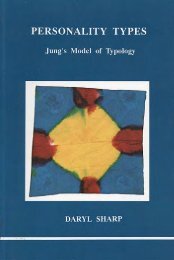Digesting Jung: Food for the Journey - Inner City Books
Digesting Jung: Food for the Journey - Inner City Books
Digesting Jung: Food for the Journey - Inner City Books
Create successful ePaper yourself
Turn your PDF publications into a flip-book with our unique Google optimized e-Paper software.
Toge<strong>the</strong>rness vs. Intimacy with Distance 69<br />
need, finally, is not compatible with loving; it only shows <strong>the</strong> degree<br />
to which one lacks personal resources. Better take your need to<br />
a <strong>the</strong>rapist than dump it on <strong>the</strong> one you love. Need in an intimate<br />
relationship easily becomes <strong>the</strong> rationale <strong>for</strong> power, leading to <strong>the</strong><br />
fear of loss on one hand, and resentment on <strong>the</strong> o<strong>the</strong>r.<br />
The key to intimacy with distance is <strong>the</strong> self-containment of each<br />
of <strong>the</strong> partners, which in turn depends on how much <strong>the</strong>y know<br />
about <strong>the</strong>mselves. When you are self-contained, psychologically<br />
independent, you don’t look to ano<strong>the</strong>r person <strong>for</strong> completion. You<br />
don’t identify with o<strong>the</strong>rs and you’re not victimized by <strong>the</strong>ir projections.<br />
You know where you stand and you live by your personal<br />
truth—come what may. You can survive cold shoulders and you<br />
can take <strong>the</strong> heat.<br />
When you are self-contained, you have your own sacred space,<br />
your own temenos. You might invite someone in, but you’re not<br />
driven to, and you don’t feel abandoned if <strong>the</strong> invitation is declined.<br />
You respect <strong>the</strong> loved ones’ boundaries, <strong>the</strong>ir freedom and privacy,<br />
even <strong>the</strong>ir secrets; you give <strong>the</strong>m space and you don’t knowingly<br />
push <strong>the</strong>ir buttons. You don’t judge and you don’t blame. There is<br />
interest in, and empathy <strong>for</strong>, <strong>the</strong> concerns of o<strong>the</strong>rs, but you don’t<br />
take <strong>the</strong>m on as your own.<br />
When you are psychologically separate, not identified with your<br />
mate, you don’t need <strong>the</strong> o<strong>the</strong>r to agree with you and you don’t<br />
need to be right. You don’t expect <strong>the</strong> o<strong>the</strong>r to change in order to<br />
suit your needs, and you don’t ask it of yourself ei<strong>the</strong>r. And if over<br />
time you can’t accept <strong>the</strong> o<strong>the</strong>r but still can’t leave, well, that is <strong>the</strong><br />
stuff of analysis: conflict and complexes.<br />
The bond between two people is a precious and mysterious<br />
thing, not entirely explained by <strong>the</strong> <strong>the</strong>ory of complexes and <strong>the</strong><br />
phenomenon of projection. But this much at least is true: <strong>the</strong>re is an<br />
optimum distance in every relationship that evolves through trial<br />
and error and good will—if you know who you are and can stop<br />
pressing <strong>for</strong> more than you get.










